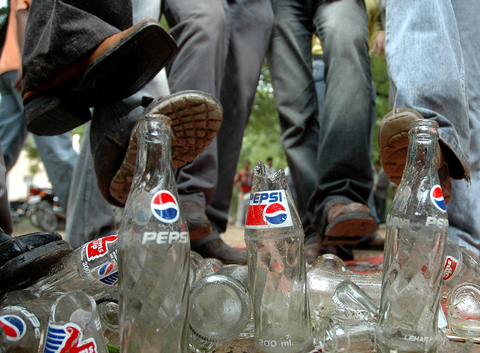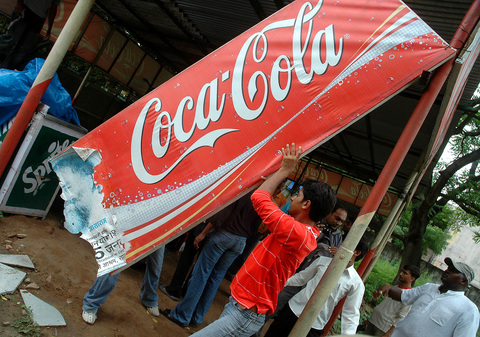Two of the world's biggest brand names, known for wooing customers around the world, are facing a credibility crisis in one of their crucial emerging markets.
This month, India's Center for Science and the Environment announced that drinks manufactured by Coca-Cola and PepsiCo contained on average more than 24 times the safe limit for pesticides, which could come from sugar, water and other ingredients.
When those reports appeared on the front pages of newspapers in India, Coke and Pepsi executives expressed confidence that they could handle the situation, but they have stumbled since.

PHOTO: AP
They underestimated how quickly events would spiral into a nationwide scandal, misjudged the speed with which local politicians would seize on an Indian environmental group's report to attack their global brands, and did not respond swiftly to quell the anxieties of their customers.
Three weeks later, Coke and Pepsi are still struggling to win back the confidence of consumers. Partial bans on their products remain in a quarter of India's states, and a complex legal battle to overturn the bans is just beginning. The companies acknowledge that things have not gone smoothly.
The battle offers a cautionary tale for multinational corporations doing business in developing countries, especially one like India, where the market for soft drinks is about US$1.6 billion, with Coke holding about a 60 percent market share.

PHOTO: AP
In some ways, the immediate response from Coke and Pepsi came right out of crisis management textbooks.
The companies formed committees in India and the US, working in tandem on legal and public relations issues. They worked around the clock fashioning rebuttals. They commissioned their own laboratories to conduct tests and waited until the results came through before commenting in detail.
Their approaches backfired. Their reluctance to give details fanned consumer suspicion. They became bogged down in the technicalities of the charges instead of focusing on winning back the support of their customers.
"They got behind the curve, and now they are chasing the crisis," said Richard Levick, president and chief executive of Levick Strategic Communications, which is based in the US and specializes in advising businesses in crises.
Coke and Pepsi executives have said repeatedly that their soft drinks meet "international standards" but concede this is a difficult fight.
"We have some way to go to restore consumer confidence in our brands," said Kari Bjorhus, Coca-Cola's communications director.
Rajeev Bakshi, chairman of PepsiCo India, agreed. "Has our side of the story got across to the consumer yet? Not really. I am concerned about that."
On Tuesday, the companies got a lift with the publication of a study by India's health ministry that said the Center for Science and Environment's findings did not conclusively prove that the soft drinks contained pesticide residue.
The center, however, was skeptical. "The minister of health is clearly more concerned with industrial health -- and not people's health," it said in a statement.
At the start, both companies were unprepared, when one state after another in India announced partial bans on Coke and Pepsi products, preventing the drinks from being sold in government offices, hospitals, and schools. Politicians exploited the populist potential.
"We were a little surprised and disappointed by the bans," said Kenth Kaerhoeg, group communications director for Coca-Cola Asia, who flew in from Hong Kong to work on the situation.
Suhel Seth, a public relations expert in India and an adviser to Coca-Cola India, said Coke and Pepsi should have known better: "Fringe politicians will continue to be publicly hostile to big Western companies, regardless of how eager they are for their investment," he said.
In hindsight, Bjorhus, the Coke communications director, said she could now see how the environmental group had picked Coca-Cola as a way of attracting attention to the broader problem of pesticide contamination in Indian food products.
Sunita Narain, who heads the group, "has serious concerns about pesticides in the food chain," Bjorhus said.
"By focusing her attention on the soft drinks industry, she gets a lot of attention," she said.
Failing to anticipate the political potency of the incident, Coke and Pepsi initially hoped that the crisis would blow over and they adopted a policy of silence.
"Here people interpret silence as guilt," said Seth, the Indian public relations expert.
"You have to roll up your sleeves and get into a street fight. Coke and Pepsi didn't understand that," he said.
The companies also failed to realize how fast news travels in modern India.
"We are living in a new, very aware India," said Amit Agnihotri, a public relations analyst in Delhi.
"We have 36 news channels. People are interested in what is happening around them. Coke and Pepsi haven't understood the power of this new India," he said.
Coca-Cola eventually decided to go on the attack, though indirectly, giving detailed briefings by executives, who questioned the scientific credentials of their products' accusers.
The executives pointed reporters to Internet blogs full of entries that were uniformly pro-Coke and they handed out the phone number for the director of an organization called the Center for Sanity and Balance in Public Life.

Taiwan is projected to lose a working-age population of about 6.67 million people in two waves of retirement in the coming years, as the nation confronts accelerating demographic decline and a shortage of younger workers to take their place, the Ministry of the Interior said. Taiwan experienced its largest baby boom between 1958 and 1966, when the population grew by 3.78 million, followed by a second surge of 2.89 million between 1976 and 1982, ministry data showed. In 2023, the first of those baby boom generations — those born in the late 1950s and early 1960s — began to enter retirement, triggering

ECONOMIC BOOST: Should the more than 23 million people eligible for the NT$10,000 handouts spend them the same way as in 2023, GDP could rise 0.5 percent, an official said Universal cash handouts of NT$10,000 (US$330) are to be disbursed late next month at the earliest — including to permanent residents and foreign residents married to Taiwanese — pending legislative approval, the Ministry of Finance said yesterday. The Executive Yuan yesterday approved the Special Act for Strengthening Economic, Social and National Security Resilience in Response to International Circumstances (因應國際情勢強化經濟社會及民生國安韌性特別條例). The NT$550 billion special budget includes NT$236 billion for the cash handouts, plus an additional NT$20 billion set aside as reserve funds, expected to be used to support industries. Handouts might begin one month after the bill is promulgated and would be completed within

The National Development Council (NDC) yesterday unveiled details of new regulations that ease restrictions on foreigners working or living in Taiwan, as part of a bid to attract skilled workers from abroad. The regulations, which could go into effect in the first quarter of next year, stem from amendments to the Act for the Recruitment and Employment of Foreign Professionals (外國專業人才延攬及僱用法) passed by lawmakers on Aug. 29. Students categorized as “overseas compatriots” would be allowed to stay and work in Taiwan in the two years after their graduation without obtaining additional permits, doing away with the evaluation process that is currently required,

RELEASED: Ko emerged from a courthouse before about 700 supporters, describing his year in custody as a period of ‘suffering’ and vowed to ‘not surrender’ Former Taiwan People’s Party (TPP) chairman Ko Wen-je (柯文哲) was released on NT$70 million (US$2.29 million) bail yesterday, bringing an end to his year-long incommunicado detention as he awaits trial on corruption charges. Under the conditions set by the Taipei District Court on Friday, Ko must remain at a registered address, wear a GPS-enabled ankle monitor and is prohibited from leaving the country. He is also barred from contacting codefendants or witnesses. After Ko’s wife, Peggy Chen (陳佩琪), posted bail, Ko was transported from the Taipei Detention Center to the Taipei District Court at 12:20pm, where he was fitted with the tracking